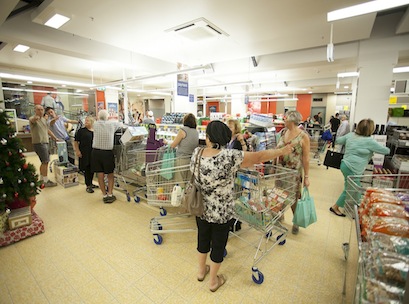 The supermarket and grocery stores industry in Australia is one of the most fiercely competitive industries.
The supermarket and grocery stores industry in Australia is one of the most fiercely competitive industries.
According to a new report by IbisWorld, the entry and rapid growth of German-owned Aldi, which almost exclusively sells private label products at discounted prices, has caused a massive shift in the industry.
The composition of supermarket shelves has changed significantly over the past five years, as the two giants of the industry, Woolworths and Coles, scrambled to compete with Aldi’s low prices.
Changing consumer sentiment and preferences have also influenced trading conditions across the industry.
Industry revenue is projected to grow by 2.3 per cent annualised over the five years through 2014-15, to reach $91.6 billion. This includes forecast growth of 2.6 per cent in 2014-15.
“Coles and Woolworths have pressured suppliers of branded products to lower their prices, helping the major supermarkets to continue their price war,” Brooke Tonkin, industry analyst, IbisWorld, said.
Supermarkets have also used weekly specials and other marketing initiatives, such as fuel dockets, to compete for consumer dollars.
These practices have come under scrutiny by regulatory bodies, with both the Senate and the Australian Competition and Consumer Commission (ACCC) to launch investigations into the conduct of Woolworths and Coles.
Growing demand for cheaper private label products has resulted in these products occupying more shelf space over the past five years.
Consumers now view private label products as genuine alternatives to more expensive, branded products.
This is largely due to Aldi’s growing presence in the industry.
“Woolworths and Coles have subsequently expanded their own private label ranges to secure their piece of the private-label pie,” says Tonkin.
Supermarket sales will continue to dominate the Retail Trade division.
The continued expansion of private label products, driven by weak consumer sentiment forecast over the next five years, will help drive industry revenue growth.
The development of sophisticated online sale methods, including smartphone and tablet applications, is expected to further increase supermarket sales.
With these online functions also come convenient alternative pick-up and home delivery options, further attracting clients to these supermarkets.
Over the next five years, competition will remain intense, with Costco and Alida stores affecting consumer shopping trends.
The top four players are Woolworths, Wesfarmers, Metcash, and Aldi.
Acquisition activity undertaken by Woolworths and Coles has contributed to increasing concentration since the mid-1970s. These two players alone account for the majority of the market.





